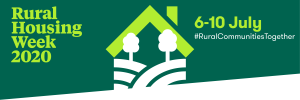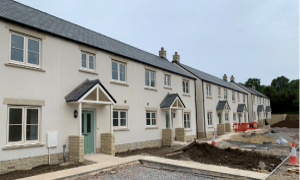T: 01822 851370 E: [email protected]
Visit RSN Survey about life in rural England to find out more.
Spotlight on Rural Housing - July 2020

A quarterly bulletin facilitated by your membership of the Rural Services Network and produced in partnership with the Rural Housing Alliance, highlighting a selection of current rural housing issues and opportunities
Rural Housing Week 2020
It’s Rural Housing Week 2020 now!
 This annual celebration of rural housing and the vital role it plays in helping to sustain thriving rural communities and services takes place from 6 to 10 July 2020.
This annual celebration of rural housing and the vital role it plays in helping to sustain thriving rural communities and services takes place from 6 to 10 July 2020.
Organised by the National Housing Federation and the Rural Housing Alliance, this is an opportunity to highlight key rural issues and shine a spotlight on successful affordable housing developments and services that offer a lifeline to local people.
Due to the challenges presented by the coronavirus crisis, some of the plans have changed for this year's Rural Housing Week. However, there are lots of online and media activities taking place nationally and around the country to put extra focus on the great work that rural housing associations are doing in so many rural towns and villages. Watch out for the hashtag #RuralCommunitiesTogether on social media.
Members of the Rural Housing Alliance have many, many examples of excellent projects across the length of rural England. A number have been highlighted on the Alliance website relating to:
- Coastal bungalows
- Community support in many forms
- Decarbonisation
- PassivHaus
- Homelessness prevention
- Retrofit
- Alternative construction methods
You can see all these, alongside the existing bank of Alliance member case studies, via this link.
Council supports new affordable homes provided in Cotswold village
 Cirencester Housing is putting the final touches to its Churnbridge Row development in North Cerney that will provide 12 much-needed new affordable homes.
Cirencester Housing is putting the final touches to its Churnbridge Row development in North Cerney that will provide 12 much-needed new affordable homes.
They are working towards a handover in late July from their contractor J Harper & Sons to provide shared ownership and rental opportunities for people local to North Cerney, Badgendon and surrounding parishes.
The North Cerney development will deliver:
- Two 2-bedroom shared ownership houses
- Six 1-bedroom flats to rent
- Four 2-Bedroom houses to rent
All properties have local connection requirements and are intended for people with a ‘primary’ connection to the parishes of North Cerney and Bagendon.
Cllr Lisa Spivey, Cabinet Member for Housing at Cotswold District Council, said: “I’m thrilled to see how well Cirencester Housing’s rural housing scheme is progressing. This scheme was grant funded by the Council and it has been one of the smoothest affordable housing projects I have seen from a community support perspective. The efforts to deliver new affordable housing in North Cerney have been welcomed at every step and we really want it to succeed.
“This is a really high-quality development and the Council is determined to see these 12 much-needed affordable homes go to local people.”
You can read more about this great additional case study for Rural Housing Week via this link.
Housing Insights from RSN
RSN Member Insights is the place to discover the statistics that define communities within membership of the Rural Services Network (RSN). It is regularly updated with new analyses, and these will be highlighted in the 'What's New' section of the RSN's Weekly Rural Bulletin. The Rural Bulletin also provides a selection of the most rurally topical news items, so do subscribe and encourage your colleagues to subscribe to what is an invaluable weekly periodical.
Updated Housing Insights analyses in June look at homelessness data and housing/rental affordability. These and other housing related analyses can be accessed via this link.
To make a suggestion of data that would benefit you by being included in the Member Insights section, please email Dan Worth, RSN’s Research and Performance Analyst, at [email protected]
No gas, no problem in Seahouses, Northumberland
 Ann Athey is one of several new tenants enjoying life in their new Bernicia bungalows built to replace poorly insulated old wooden properties in Seahouses, Northumberland.
Ann Athey is one of several new tenants enjoying life in their new Bernicia bungalows built to replace poorly insulated old wooden properties in Seahouses, Northumberland.
Bernicia has handed over the keys to nine new homes, comprising six bungalows in James Street and three new two-bedroomed homes which have also been built in the town’s Stone Close.
Construction of the properties started in May 2019 and was completed by Bernicia’s in-house build team earlier this year. Ann was one of the first tenants to receive the keys to her new home.
Ann said: “I’m overjoyed that moving day is here. My new home has everything where I need it and it’s much more accessible than where I live now. Getting a new house built can seem like a daunting thing to do but Bernicia has provided a brilliant service and been really supportive, making the whole process really easy. I just can’t wait to get settled in.”
Seahouses is a seaside community on the stunning north Northumberland coast, a popular tourist destination with a thriving centre and holiday park accommodation.
John Johnston, chief executive at Bernicia, said: “The original houses on the site were unsuitable for modern living and the outdated heating systems were very expensive to run. We’ve replaced them with brand new buildings that are energy efficient, providing homes that make quality of life affordable and that are enjoyable to live in.”
The underfloor heating, using air source heat technology is certainly a hit with the new tenant.
You can read more about this project here.
Donation supports local food banks during Covid-19 crisis
 Broadacres has provided £4,000 worth of funding to support three food banks which are continuing to help local people in need despite the upheaval caused by the COVID-19 pandemic.
Broadacres has provided £4,000 worth of funding to support three food banks which are continuing to help local people in need despite the upheaval caused by the COVID-19 pandemic.
The three charities, Hambleton FoodShare, Influence Church and Community Works, say the donations are well timed because the number of food parcels being handed out have increased as a result of the Coronavirus crisis.
At the same time, donations to the food banks in Northallerton and Thirsk have fallen due to many collection points now being closed because of lock-down measures, meaning people are less likely to be leaving their homes to drop-off supplies.
Hambleton FoodShare in Northallerton were delighted to receive £1,650 from Broadacres and Co-ordinator Alison Grainger said: “In February, before the lockdown, we handed out 160 parcels and in April this figure had risen to over 300 parcels. One of the reasons for this was that people had either lost their jobs, or had been furloughed, and had to wait to receive Universal Credit or their furlough payment. It’s also been harder for people to make donations due to the lockdown restrictions now in place, so this donation from Broadacres is very much appreciated.
“It means we can buy food and other essentials, such as nappies and toilet rolls, to provide people with emergency 3-day parcels that will hopefully tide them over until their personal circumstances improve.”
The Influence Church in Richmond has also received £1,650 to support its StoreHouse food bank and Community Works, in Thirsk, has received £700.
Chris Fawcett, Broadacres’ Business Transformation Director, said: “We’re pleased to have been able to support these charities which are doing such an important job helping to provide emergency food parcels to people in our local communities. They are continuing to do this despite operating in the most challenging of circumstances at present and we would like to thank all the staff and volunteers for the amazing work they are doing.”
You can read more here.
District Council decides to build council houses again
18 years after Derbyshire Dales District Council transferred its 3200 council homes to a new stock transfer company, the Council has approved a return to owning council housing. The programme will see 52 homes delivered initially, with some homes built on council land, empty homes purchased from private owners and S106 homes on new developments.
The initiative was supported by a grant from the Local Government Association’s Housing Advisers Programme, which funded the appointment of consultants to test and develop the financial viability of becoming a landlord again. Given the complexity of developing and managing social housing, the District Council is going out to tender for a Development Agent and Management Agent.
The new homes will be funded from S106 income from private developments and Right to Buy receipts from the former council stock. The rental income will cover the cost of the managing agent, future maintenance and provide a new long-term revenue stream to support the Council’s wider strategic objectives. The first home to be taken into council ownership will be a property bequeathed to the Council by a former resident. For further information please contact Rob Cogings, Director of Housing on email [email protected]
Warmer homes are on their way in Shropshire & Herefordshire
The Connexus Warmer Homes project is part-funded by the European Regional Development Fund (ERDF) which is contributing one million pounds to a £2.6m project to make 132 of Coonexus existing homes more comfortable and energy-efficient.
The Warmer Homes ERDF project will investigate whether a Passivhaus approach to designing energy efficiency investment in Connexus homes is the right plan for the Housing Association’s investment over the next 30 years.
The Warmer Homes project will improve the energy efficiency of 132 Connexus properties across Shropshire and Herefordshire. In the short term, this will involve work on insulation in Shropshire and Herefordshire and replacing heating systems in Shropshire properties. The long-term objective of the project is to ensure Connexus make the right investments in their properties to reach UK targets on energy efficiency and the reduction of greenhouse gas emissions.
Connexus has already invested in new build to Passivhaus standard and has found that customers have found significant savings in energy bills compared to those for typical new build houses and really enjoy living in their new homes. Connexus wants its customers in all its houses to have the same experience of comfortable, energy-efficient homes.
Connexus believes that this is the first project of its type in the UK. As well as benefits to customers, there will also be opportunities through the development of a 30 year investment plan for the supply chain and area regeneration.
You can read more about this exciting project here.
Homelessness support in Eden, Cumbria
Whilst the Eden District has a relatively low level of visible rough sleeping and homelessness, there remains a significant issue with households often sofa surfing between friends and family or hidden away in very rural and isolated areas.
With funding from the Ministry for Housing Communities and Local Government, Eden Housing Association has been able to develop a small, but flexible supported lettings scheme for those who are rough sleeping or at risk of rough sleeping with limited housing options and support needs. They have a person-centred approach, and support can now be delivered anywhere across Eden HA’s properties allowing them to be flexible in where the property is located helping individuals to remain as close as possible to family and friends too.
John Clasper of Eden Housing Association explains: “An example of where this new way of working has helped considerably is a situation involving a young person (we’ll call Jack), living in a rural area with his grandfather who sadly passed away. Jack was forced to vacate the property and was unable to live with any other family member. Jack had never lived alone, presented with Autism and Dyspraxia, and also had some history of substance misuse. Jack clearly required supported accommodation but wished to remain close to his family. EHA set Jack up in one of our community properties and provided intense support, including independent living skills, applying for benefits and budgeting advice, sought assistance from Unity (Drug & Alcohol services) and instigated a Care Act assessment which resulted in additional support from the County Council. Jack has been in his supported tenancy for almost a year, and will soon move on into a starter tenancy to begin his journey into independent living.
“During the COVID-19 pandemic, we have seen a dramatic increase in the number of people requiring temporary accommodation. We have needed to make use of local Bed & Breakfast accommodation, as well as sourcing additional properties from within our stock holding to use as Temporary Accommodation. We intend to convert these in to supported lettings, allowing those households to remain in the properties and benefit from having settled accommodation.
“It would be extremely difficult to sustain this type of flexible project without effective collaboration and also the grant funding received from our partners.
You can read more about Eden’s service here.
ACRE promotes Rural Housing Week
Action with Communities in Rural England (ACRE) has got fully behind Rural Housing Week this year sharing stories throughout the week about the importance of affordable housing to rural communities. ACRE network members around the country are heavily involved in a variety of rural housing projects and activities. For example, a number of ACRE Network members host Rural Housing Enablers who help make many local housing schemes happen, working closely with Housing Associations, local authorities, landowners and local communities. Community engagement activities are also strong across the ACRE network as is close working with many members of the Rural Housing Alliance.
You can read more about ACRE and its members here.
Rural Design Centre seeks resident views on housing in North East
To support economic growth through innovation in Northumberland and other rural areas, the Rural Design Centre is working with businesses, innovators, researchers, experts and those living in the rural North East to identify specific challenges faced by local people.
They are currently looking at rural housing and are engaging with key stakeholders and residents across rural Northumberland to fully understand what the challenges in this area are. This could include concerns with issues linked to community, improving existing homes, planning new build developments, sustainability, flexibility and accessibility.
They are interested in housing challenges that might include:
- Ageing – What are the key concerns and worries of current and future ageing residents and homeowners in rural Northumberland?
- New build – What are the new design considerations from the residents, community design, and developer perspective?
- Existing build – What are the design needs to make existing housing stock fit for the next 5, 10, 25 and 50 years?
- Flexibility of services – How might homes and services adapt to the changing needs of residents throughout their lifetime?
- Community – What should be the main focus for sustaining social communities in new physical community housing?
Results and findings from this work will be published in a future edition of this Spotlight.
Lockdown drives demand for rural properties
RSN report that The Telegraph has published several articles showing a renewed interest from buyers searching for small farms, smallholdings or rural properties since lockdown began
Thousands of 'panic movers' are quitting cities for rural or village locations, acting now before the economy plummets into recession and the housing market stalls, according to the paper.
Savills has seen a 90 per cent increase in demand from house hunters for country locations in the past three months compared to the same period last year.
Demand for flats to rent and buy has plummeted, according to the property portal Rightmove, while estate agents in coveted rural locations such as the Cotswolds, the Chilterns and the South Downs are reporting a surge in inquiries from urbanites, as are those in prime coastal spots in Cornwall, Devon, Norfolk and Suffolk.
Many of this new wave of buyers have proved that they can work remotely from home, removing the need to be in an office environment five days a week.
The ability to commute less frequently is allowing buyers to consider a much wider area when looking for property.
You can read more and access the Telegraph articles via this link.
Community grants available for housing charities
In 2020 Nationwide Building Society will be awarding £4m to housing charities across the UK helping charities to build society, nationwide.
Charities, Community Land Trusts and housing co-operatives who are making positive changes in their local areas can apply for grants of between £10,000 and £50,000. The funding period is between one and two years and Nationwide will fund between 50% to 100% of the total cost of the project. Projects are favoured which:
- help charities get back on their feet after the impact of Covid-19
- illustrate a clear link to Nationwide’s ambition for everyone to have a place fit to call home and can demonstrate the impact their project will have on the local community
- are supporting people in housing need, in original or creative ways
- have the potential to inspire and be used by others across the country
- have robust plans to measure and report on the difference the grant will make
- can demonstrate sustainability beyond the life of the grant
- can evidence knowledge of local issues and have a network of local connections
The deadline for applications is 31 July 2020. You can read more via this link.
Working together in lockdown - Case Studies from across communities in Rural England
The Rural Services Network is delighted to launch a booklet detailing the case studies that it has received of the ways in which rural communities have pulled together to support their most vulnerable residents during lockdown
The Chair of the Rural Services Network, Councillor Cecilia Motley said:
"It is heart-warming to see how our rural communities have come together to support their most vulnerable residents in this difficult time. However, our communities raise a number of important issues which need attention and support from Government. Our rural communities should not be left behind."
Many of these initiatives were started before the Government launched it’s national NHS Volunteer Scheme, with rural communities recognising that there was a particular need to ensure that their residents had access to basics such as shopping and repeat prescriptions. Many went much further initiating regular telephone calls to check on residents, online quizzes and resources for children to continue their learning.
Communities were asked to provide some details of their initiative along with information about what would help them from a national perspective. The Rural Services Network has been forwarding these responses to DEFRA, as part of the Rural Impact Stakeholder Forum to ensure that they have information about experiences on the ground in rural areas.
10 Case studies were published each week but as lockdown eases, the RSN has produced the booklet to bring them all together.
→ The full document can be accessed here
Rural community energy feasibility funding available
The Rural Community Energy Fund (RCEF) is a £10 million programme which supports rural communities in England to develop renewable energy projects, which provide economic and social benefits to the community.
RCEF provides support to rural communities in 2 stages:
- stage 1: grants of up to £40,000 for a feasibility study for a renewable energy project
- stage 2: grants of up to £100,000 for business development and planning of feasible schemes
RCEF is being run by 5 regional Local Energy Hubs. If you would like to register your interest for the scheme, or would like further information, please contact the relevant hub for your area. Details are available via this link.
Keep Calm and Join Up!RSN exists to enable the issues facing the rural areas of England to be identified, information and good practice to be shared and government to be challenged to address the needs and build on the opportunities which abound in rural areas. If you know a rural housing organisation that would benefit from membership, please ask them to consider joining us. RSN is a solely rural focussed organisation with an electronic distribution network in excess of 25,000 individuals. We reach right across all the rural areas of England and provide a sustained and respected voice for rural areas at national level. Anyone who wants to talk to us about our role and services in relation to rural housing should contact Andy Dean to find out more. If you are a small housing organisation operating in rural England, you can have access to all the services of RSN for an annual subscription from just £255 plus VAT. RSN exists to share information, promote good practice and represent the voice of rural England at a national level. Check out the website for more information or contact Andy Dean to join up. |



